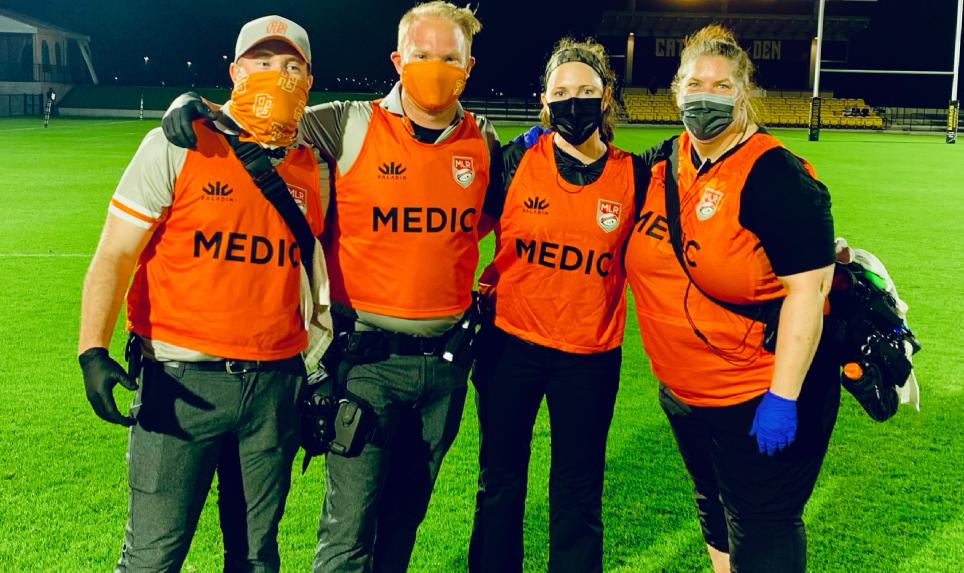ABOUT NATIONAL ATHLETIC TRAINING MONTH
Athletic trainers (ATs) are highly-skilled health care professionals who work tirelessly behind the scenes to provide compassionate health care for athletes, patients, soldiers, workers and performers. March is National Athletic Training Month (NATM), a time to celebrate the actions that ATs take to impact health care in work, life and sport. National Athletic Training Month is sponsored by the National Athletic Trainers’ Association (NATA), the professional members association for certified athletic trainers and others who support the athletic training profession.
ATs provide health care EVERYWHERE.
ATs provide health care in all kinds of places, not only from middle schools to professional sports, but also in the armed forces, public safety, and work places such as factories and distribution centers. ATs are experts in injury and illness prevention – in fact, ATs spend nearly 50% of their time providing preventative health care. ATs are also prepared to act in case of an emergency, such as sudden cardiac arrest, exertional heat stroke or cervical spine injury. Perhaps one of the most rewarding parts of being an AT is helping an athlete, performer or public servant return to the sport, stage or job they love after sustaining an injury. ATs work collaboratively with other health care professionals to rehabilitate an active patient to work, life and sport. Other settings where ATs work include:
- Occupational Health - Athletic trainers keep employees working at full capacity, improve company productivity and help reduce health care and insurance costs.
- Public Safety - From firefighters and police to service members and their families, athletic trainers provide care to those in the public safety sector and armed forces.
- Hospitals and Clinics - Athletic trainers provide value through skills in triage, administration and general patient education.
- Performing Arts - Athletic trainers create specialized injury prevention and rehabilitation treatment plans, resulting in lower costs and quicker recovery time for dancers, musicians and vocalists.
CELEBRATE ATHLETIC TRAINERS
March is National Athletic Training Month, a time to celebrate the positive impact that ATs have on work, life and sport.
SHARE YOUR APPRECIATION ON SOCIAL MEDIA
Social media is an easy way to shout out an AT who has made an impact in your life. Write a post, take a picture, use video and tag the AT you want to celebrate. Feel free to get creative, have fun or even be sentimental with your post. As long as you’re appreciating an athletic trainer, you’re doing it right. Be sure to use #NATM2022.
PUT YOUR THOUGHTS IN PRINT OR ONLINE
Seek out opportunities to celebrate and raise awareness for the athletic training profession online or in print. School or hospital websites, sports programs, magazines or other printed publications are great vehicles to publish an advertisement to raise awareness or even an open thank you letter to the profession.
Display posters or advertisement on internal and/or external signage available to you (bulletin boards, billboards, locker room displays, etc.). For friends of the profession with traditional media buys, leverage your add-value or PSA inventory to show your support.
TELL THE PRESS
If you don’t have an athletic trainer, or you think you need more, then reach out to your local newspaper to get your argument across in an Op-Ed or letter to the editor. Additionally, if you have an athletic trainer you would like to celebrate, take out an ad or work with the school to place a feature story.
ADD A PERSONAL TOUCH
There are so many ways to thank athletic trainers during National Athletic Training Month, and a little goes a long way. Send an email or a handwritten note. If you work with an athletic trainer, show up for an early morning rehab session with fresh coffee and a pat on the back. Call them on the phone just to say thanks. Tell his or her boss about the amazing work that they do. Taking time to recognize athletic trainers, however you choose to do it, shows your sincere appreciation for the role they play within athletic health care.
